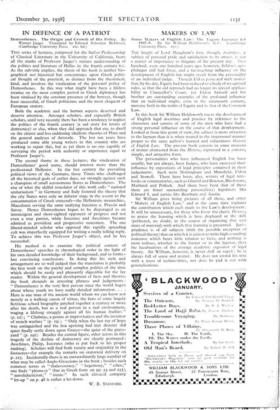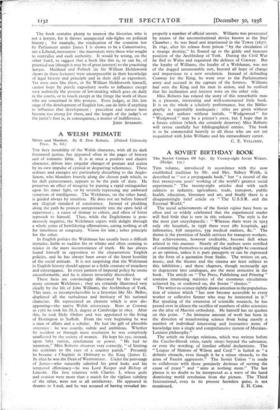MAKERS OF LAW
THE length of Lord Maugham's foot, though, doubtless. a subject of personal pride and satisfaction to its owner, is not a matter of importance to litigants of the present day. Two hundred, even one hundred years ago, however, Selden's apo- phthegm still had force, and a far-reaching influence on the development of English law might result from the personality of an individual judge. Thou3h Eld3n protested with justice that, by his day, Equity had been reduced to a body of recognised rules, so that the old reproach had no longer its special applica- bility in Chancellor's Court, yet Eldon himself and his brother are outstanding examples of the profound influence that an individual might, even in the nineteenth century, exercise both in the realm of Equity and in that of the Common Law.
In this book Sir William Holdsworth traces the development of English legal doctrines and practice by reference to the characters and careers of some of the men who have had a strong personal influence on the course of that development. Looked at from this point of view, the subject is more attractive to the layman than it is when treated in the impersonal manner proper to the same author's learned and voluminous History of English Law. The present book consists in some measure of matter abstracted from the History, expressed in a concise, simple, and attractive form.
The personalities who have influenced English law have usually, but not always, been Judges, who have exercised their influence by expositions of legal principles contained in their judgements. Such were Nottingham and Mansfield, Eldon and Stowell. There have been, also, writers of legal text- books or commentaries, such as Glanvil and Bracton, Blackstone, Maitland and Pollock. And there have been (but of these there are fewer outstanding personalities) legislators like Edward I, and jurists like Bentham and Austin.
Sir William gives living pictures of all these, and other "Makers of English Law," and at the same time explains the contribution which each made to the Law's development. It will be unnecessary, for those who know the classic History, to praise the learning which is here displayed or the skill (perfected, no doubt, in the course of organising that vast mass of material) with which that learning is presented. Juris- prudence is of all subjects (with the possible exception of political theory) that on which it is easiest to write high-sounding nonsense which bears little relation to facts, and nothing is more tedious, whether to the lawyer or to the layman, than the lucubrations of the average academic expositor of legal theory. Sir William, however, is never dull or vapid ; he is always full of sense and matter. He does not crowd his text with a mass of technicalities, nor does he pad it out with generalisations. The book contains plenty to interest the historian who is not a lawyer, for it throws unexpected side-lights on political history ; for example, the vindication of the common law by Parliament under James I is shown to be a Conservative, not a Liberal, movement : the innovators were those who sought to centralise and exalt authority. It would be wrong, on the other hand, to suggest that a book like this is, or can be, of practical use (though it may be of great interest) to the practising lawyer. Maitland and Pollock (as Sir William Holdsworth shows in these lectures) were unsurpassable in their knowledge of legal history and principle and in their skill as expositors. Yet even men like these, or Sir William Holdsworth himself, cannot hope by purely expository works to influence except very indirectly the process of law-making which goes on daily in the courts, or to touch except at the fringe the work of those who are concerned in this process. Even judges, at this late stage of the development of English law, can do little if anything to influence that development : precedent and statute have become too strong for them, and the length of the judge's or the jurist's foot is, in consequence, a matter of indifference.
JoHN SPARROW.



































 Previous page
Previous page